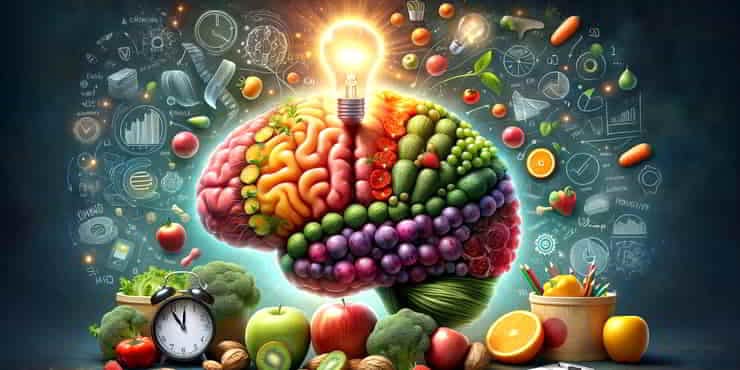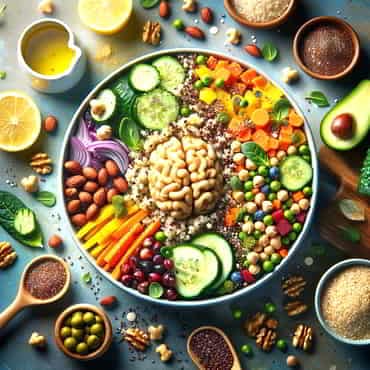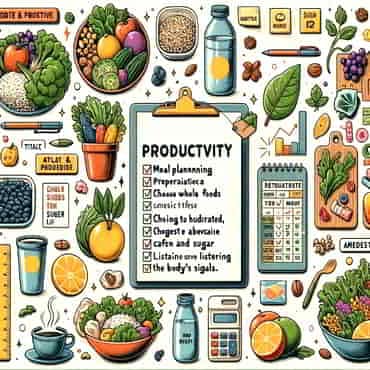Food And Productivity: The Impact Of Diet

Estimated reading time: 12 Min
The food we eat leads to energy levels with a direct effect on our concentration and overall brain function. Our food and productivity are closely connected.
Productivity shapes our daily achievements and long-term goals.
It’s the engine behind our professional successes and personal developments.
While many factors contribute to productivity, including sleep, exercise, and mental health, one area often overlooked is nutrition.
This article explores the important role nutrition plays in enhancing or hindering our productivity, shedding light on the dietary choices that can make a significant difference in our work and life.
The Science Behind Food And Productivity
The link between nutrition and brain health is a growing area of interest among scientists and health professionals.
Nutrients from the food we eat fuel our brains, affecting how we think, feel, and work.
For example, glucose, derived from carbohydrates, is the brain’s primary energy source, essential for maintaining cognitive functions.
However, not all foods are equal in this regard.
Slow-releasing carbohydrates, such as whole grains, are more beneficial for sustained mental energy than their refined counterparts, which can lead to spikes and crashes in blood sugar levels.
Research also highlights the role of fatty acids in brain health. Omega-3 fatty acids, found in fish, nuts, and seeds, are crucial for maintaining the structure of brain cells, thus supporting cognitive functions such as memory and decision-making.
Furthermore, antioxidants from fruits and vegetables protect the brain from oxidative stress, which can damage cells and affect brain function over time.
Key Nutrients That Enhance Productivity
Several nutrients are known to have a direct impact on brain function and, by extension, productivity. Here’s a closer look at some of these essential nutrients:
- Omega-3 Fatty Acids
These fats are vital for brain health, improving mood, and enhancing cognitive functions. Sources include fatty fish like salmon, flaxseeds, and walnuts. - B Vitamins
B vitamins, particularly B6, B12, and folic acid, play a role in producing brain chemicals that affect mood and other brain functions. Deficiencies in these vitamins can lead to decreased productivity due to fatigue and reduced concentration. Foods rich in B vitamins include poultry, eggs, and leafy greens. - Antioxidants
Vitamins C and E, and beta-carotene, act as antioxidants, protecting the brain against damage from free radicals. Brightly coloured fruits and vegetables, such as berries, oranges, and carrots, are excellent sources. - Iron
Iron is crucial for cognitive functioning and energy levels. Low iron levels can lead to fatigue and impaired cognitive function. Lean meats, beans, and fortified cereals are good sources of iron. - Protein
Adequate protein intake is essential for neurotransmitter function and brain health. Foods like chicken, tofu, and legumes provide the amino acids needed for neurotransmitter production, which can influence our mood and productivity.
Incorporating a variety of these nutrient-rich foods into your diet can support brain health and improve your productivity levels.
Dietary Patterns for Optimal Productivity
Adopting specific dietary patterns can be beneficial for maintaining high productivity levels.
The Mediterranean diet, for instance, is heralded for its positive effects on brain health.
This diet emphasises fruits, vegetables, whole grains, fish, and healthy fats, providing a balanced intake of the nutrients mentioned earlier.
Studies suggest that this dietary pattern can improve cognitive function and reduce the risk of degenerative brain conditions.
Another possible approach is the plant-based diet, which focuses on foods derived from plants, including vegetables, grains, nuts, and fruits while minimizing animal products.
This diet not only supports brain health but also contributes to overall health and well-being.

Balanced meals are key to avoiding the mid-afternoon slump.
Combining complex carbohydrates with proteins and healthy fats can help maintain steady blood sugar levels, ensuring a constant energy supply for the brain.
For example, a lunch consisting of a quinoa salad with vegetables, chickpeas, and a handful of nuts provides slow-releasing energy, protein, and healthy fats to keep you focused and productive throughout the afternoon.
By understanding and applying the principles of nutrition science, you can make informed dietary choices that enhance your productivity.
Whether it’s by incorporating more omega-3 fatty acids into your diet, ensuring you get enough B vitamins, or following a dietary pattern known to support brain health, the food you eat plays a crucial role in your ability to perform at your best.
The Impact of Hydration on Productivity
Staying adequately hydrated is another crucial aspect of maintaining productivity.
The human brain is composed of approximately 75% water, and even slight dehydration can impair cognitive functions such as concentration, alertness, and short-term memory.
Dehydration can lead to feelings of fatigue and sluggishness, directly impacting our ability to perform tasks effectively.
Experts recommend drinking at least 8 glasses of water a day, though this can vary based on individual needs, climate, and activity levels.
Incorporating foods with high water content, such as cucumbers, tomatoes, and watermelon, can also help meet hydration needs.
Regular water intake throughout the day ensures that your brain remains hydrated, supporting optimal function and productivity.
Avoiding Productivity Pitfalls: Foods That Can Hinder Performance
While certain foods can enhance productivity, others may have the opposite effect.
Foods high in refined sugars, for example, can lead to quick spikes in blood sugar followed by rapid crashes, resulting in fatigue and decreased concentration.
Similarly, excessive caffeine consumption can disrupt sleep patterns and lead to dependence, with diminishing returns on alertness over time.
Processed foods, high in trans fats and artificial additives, can also negatively affect brain health and mood, potentially leading to decreased productivity.
It’s essential to be mindful of these dietary pitfalls and moderate the consumption of foods that can hinder performance.
Practical Tips for Incorporating Nutrition into a Productive Lifestyle
Adopting a diet that supports productivity doesn’t have to be complicated. Here are some practical tips to help integrate nutritious eating habits into your daily routine:

- Plan Your Meals
It makes sense to take time each week to plan your meals, ensuring you include a variety of nutrient-rich foods.
Meal planning can help prevent last-minute unhealthy eating choices. - Prepare in Advance
Whenever possible, prepare meals and snacks in advance.
This can include chopping vegetables for quick snacks, cooking grains in bulk, or making a batch of healthy muffins for breakfast on the go. - Choose Whole Foods
Focus on whole, unprocessed foods for your meals and snacks. These foods provide the nutrients your brain needs to function optimally. - Stay Hydrated
Keep a water bottle with you throughout the day as a reminder to stay hydrated. Adding slices of lemon, lime, or cucumber can make water more appealing if you find it bland. - Be Mindful of Caffeine and Sugar
Monitor your intake of caffeine and sugar to avoid energy crashes. Opt for herbal teas or decaffeinated coffee if you find yourself relying too heavily on caffeine. - Listen to Your Body
Pay attention to how different foods affect your energy and focus. You may find that certain foods, even if they are considered healthy, don’t agree with you. Adjust your diet accordingly.
FAQs
What are free radicals?
Your body is like a bustling city, with cells working tirelessly to keep everything running smoothly. Just like in any busy metropolis, there are rogue elements – in your body, they’re called “free radicals” – if left unchecked, they wreak havoc. Free radicals are molecules with unpaired electrons, making them highly reactive and prone to causing damage to cells, a bit like tiny troublemakers stirring up chaos in the city streets.
These troublemakers can be generated during normal bodily processes like metabolism or when we’re exposed to external factors like pollution, UV radiation, or unhealthy foods. They can damage cell membranes, proteins, and even our precious DNA, leading to a host of health issues and contributing to ageing.
What are anti-oxidants?
Think of anti-oxidants as your dedicated clean-up crew, ready to neutralise troublesome free radicals before they cause too much harm. Antioxidants donate electrons to stabilise free radicals, turning them into harmless citizens. They travel around our bodies, having been donated by various foods like fruits, vegetables, nuts, and even some beverages like green tea and even red wine.
Antioxidants therefore help protect our cells from damage and support overall health keeping everything in balance and functioning smoothly.
So, munching on some berries or sipping an occasional red wine, aren’t just tasty treats – they also give your body’s clean-up crew a helping hand!
What is a neurotransmitter?
Neurotransmitters are tiny messengers of our brain’s bustling communication network! Your brain is active, like a lively city, buzzing with activity, and neurotransmitters are like couriers zipping around, delivering important messages from one neuron to another.
These molecules are produced by nerve cells (neurons) and play an essential role in transmitting signals throughout the brain and nervous system. They’re like the postal service of our brain, ensuring that information flows smoothly and efficiently.
Each neurotransmitter has its unique personality and job to do. For instance:
Dopamine is the feel-good neurotransmitter, responsible for sensations of pleasure and reward. It motivates us to chase after happy moments.
Serotonin, the mood stabilizer, helps regulate mood, sleep, and appetite, acting as a calming influence amidst life’s ups and downs. Think of it as the soothing voice of reason, keeping our emotional rollercoaster on a steady track.
Acetylcholine is the memory maestro. It’s essential for learning and memory, ensuring that we can recall important information when we need it most. It’s like the librarian of our brain and catalogues memories for easy access.
These are just a few of the many neurotransmitters at work in our brain, that play vital roles in shaping our thoughts, emotions, and behaviours. Without them, our brain’s communication network would be like a city without roads – chaotic and disconnected.
What are “healthy fats”?
Healthy fats are often unsung heroes of our diet! Just like a well-oiled machine needs the right kind of lubricant to run smoothly, our bodies thrive on the right types of fats to function optimally.
When we talk about healthy fats, we’re referring to unsaturated fats, which come in two main varieties: monounsaturated fats and polyunsaturated fats. They’re the VIPs of the fat world, offering a wide range of health benefits without weighing us down with the negative effects associated with their counterparts, saturated and trans fats.
Monounsaturated fats, found in foods like avocados, nuts, and olive oil, can help lower bad cholesterol levels, reduce inflammation, and support heart health, making them a staple in any balanced diet.
Polyunsaturated fats, like essential fatty acids:
Omega-3s, found in fatty fish like salmon, flaxseeds, and walnuts, are renowned for their anti-inflammatory properties and their role in promoting brain health and cardiovascular function and
Omega-6s, found in sources like sunflower seeds, soybeans, and corn oil, are important for brain function and skin health.
Together, they form the backbone of a nutritious diet, providing us with sustained energy, supporting vital bodily functions, and even helping us absorb fat-soluble vitamins like A, D, E, and K.
What are “trans fats”?
In contrast, trans fats are notorious villains of the fat world, lurking in processed foods and ready to wreak havoc on our health! These are fats created through a process called hydrogenation, where liquid oils are transformed into solid fats to increase shelf life and improve texture.
Trans fats are like double rogue agents of the fat world, capable of raising “bad” LDL cholesterol levels while simultaneously lowering “good” HDL cholesterol levels. This combination can significantly increase the risk of heart disease, stroke, and other cardiovascular issues, making trans fats public enemy number one in the realm of nutrition.
Historically, such fats hide in plain sight, lurking in packaged snacks, fried foods, and even some margarine and spreads. They’re like the shape-shifters of the food industry, masquerading as harmless ingredients while silently sabotaging our health.
Fortunately, awareness of the dangers of trans fats has led to efforts to reduce their presence in our food supply. Many countries have implemented regulations requiring food manufacturers to label trans fats on their products, and some have even banned them altogether.
What are “complex carbohydrates”?
Complex carbohydrates on the other hand are the unsung heroes of sustained energy and overall health! They are the slow-burning fuel that keeps our bodies running smoothly throughout the day.
When we talk about complex carbohydrates, we’re referring to carbohydrates that are made up of long chains of sugar molecules. Unlike their simpler counterparts, such as refined sugars and white flour, complex carbohydrates can be the foundation of a nutritious diet, offering a host of health benefits without the rapid spikes and crashes in blood sugar levels.
These wholesome carbohydrates are found in foods like whole grains, legumes, vegetables, and fruits, and they’re packed with essential nutrients like fibre, vitamins, and minerals. They’re nutrient-packed, fuel our bodies and keep us feeling full and satisfied for longer periods.
One of the key benefits of complex carbohydrates is their slow digestion and absorption, which helps maintain steady blood sugar levels and provides a sustained release of energy. They’re the marathon runners of the carbohydrate world, pacing themselves for the long haul rather than sprinting and fizzling out quickly.
Plus, the fibre found in complex carbohydrates plays a crucial role in supporting digestive health, regulating cholesterol levels, and even promoting a healthy weight by keeping us feeling fuller for longer.
How much caffeine is OK?
Determining how much caffeine is okay for you depends on various factors, including your sensitivity to caffeine, overall health, and lifestyle habits. However, general guidelines suggest that moderate caffeine consumption is generally considered safe for most adults.
For many people, consuming up to 400 milligrams of caffeine per day – roughly the amount found in about four 8-ounce cups of brewed coffee – is considered safe and may even offer some health benefits, such as improved cognitive function and alertness.
However, it’s essential to be mindful of your caffeine intake and how it affects you personally. Some individuals may be more sensitive to caffeine and may experience adverse effects, such as insomnia, nervousness, jitteriness, or gastrointestinal discomfort, even with smaller amounts. Some people find that limiting caffeine consumption to the morning only is beneficial.
Additionally, certain groups should exercise caution with caffeine consumption. Pregnant individuals, for example, are typically advised to limit their caffeine intake to 200 milligrams per day to reduce the risk of adverse pregnancy outcomes. People with certain medical conditions, such as heart arrhythmias, anxiety disorders, or gastrointestinal issues, may also need to limit their caffeine intake or avoid it altogether.
It’s also essential to consider sources of caffeine beyond just coffee, such as tea, energy drinks, soda, and chocolate. Monitoring your overall caffeine intake from all sources can help you maintain a healthy balance and avoid consuming too much.
Ultimately, it’s important to listen to your body and adjust your caffeine intake accordingly. If you notice any negative effects or if caffeine disrupts your sleep or overall well-being, consider reducing your intake or switching to decaffeinated alternatives. As always, if you have any concerns or questions about caffeine consumption or other health factors, it’s best to consult with a healthcare professional for personalized advice.
Summary
Nutrition plays a foundational role in determining our productivity levels.
By understanding and leveraging the connection between what we eat and how we perform, we can make dietary choices that enhance our cognitive function, energy levels, and overall productivity.
This involves including specific nutrients and hydration into our daily routines and avoiding foods that can detract from our performance.
With deliberate dietary habits, we can support our brain health and maximise productivity, ultimately achieving personal and professional goals more effectively.
Now that you’ve seen how closely your diet is linked to productivity, it’s time to take action.
Start by evaluating your current eating habits and identifying areas for improvement.
Remember, small changes can lead to significant benefits over time.
Experiment with incorporating more brain-boosting foods into your diet, staying hydrated, and minimising consumption of foods that can hinder your productivity.
By making deliberate choices about what you eat and drink, you empower yourself to reach new heights in your work and personal life.
Take the first step today towards a more productive, energised, and focused you.
If you have knowledge and experience to add, please leave a comment.
🙂
Richard






